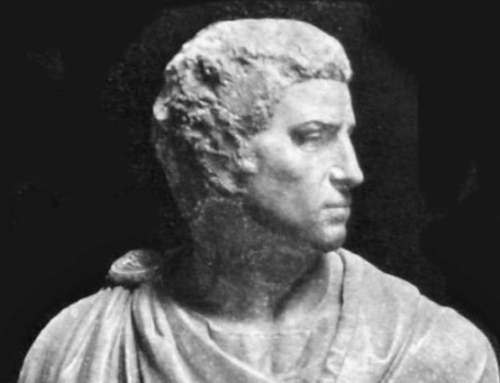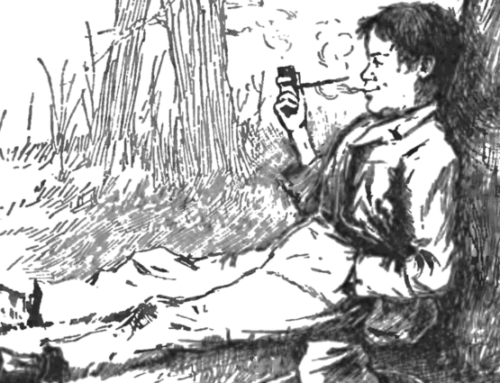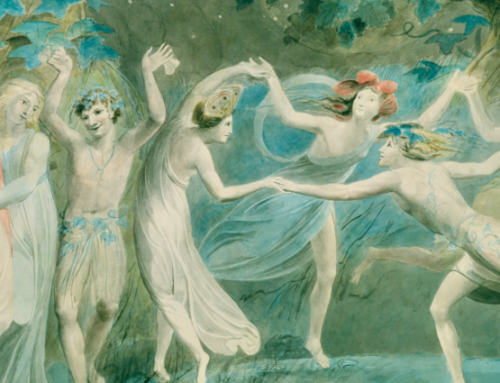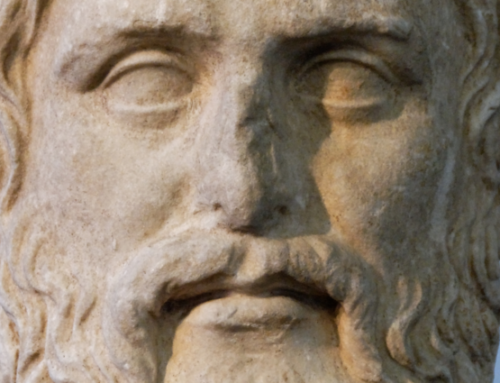 William Shakespeare’s women display virtue while being tested in extreme situations not of their own making. One of the greatest of them, Viola in Twelfth Night, is in extreme circumstances to which she must apply the virtue of patience. That “patience is a virtue” has been proverbial since the Middle Ages—Chaucer’s Franklin in The Canterbury Tales says that it is “a high virtue, certainly”—but it often does not seem like one, because in practicing patience, one seems to do nothing. Or perhaps patience seems a weak virtue, because it may be the product of sterile resolutions easily forsaken.
William Shakespeare’s women display virtue while being tested in extreme situations not of their own making. One of the greatest of them, Viola in Twelfth Night, is in extreme circumstances to which she must apply the virtue of patience. That “patience is a virtue” has been proverbial since the Middle Ages—Chaucer’s Franklin in The Canterbury Tales says that it is “a high virtue, certainly”—but it often does not seem like one, because in practicing patience, one seems to do nothing. Or perhaps patience seems a weak virtue, because it may be the product of sterile resolutions easily forsaken.
But virtues are generally chosen and formed in the plays only when there are few if any other choices, a truth so obvious that Shakespeare in one instance employs a cliché to emphasize it: “There is no virtue like necessity,” John of Gaunt tells the soon-to-be exiled Bolingbroke in Richard II (1.3.278). Bolingbroke will return to England and overthrow the king who exiled him.
Viola’s patience achieves for her a perhaps even more satisfying reward. Already an orphan when the play opens, she is thrown by means of a (not infrequent) Shakespearean shipwreck into the land of Illyria, where she discovers that she has also apparently lost to the sea her only relative, a brother. She uses this occasion, however, not to whine but to decide quickly what is to be done—for patience can be no virtue if one first does not do everything possible to overcome difficulties. Many of the proverbs have matching opposites, so it was also sometimes said that “patience is a beggar’s virtue.” Shakespeare offers his own version in Richard II, when the Duchess of Gloucester speaks to John of Gaunt about his unwillingness to avenge his brother’s death: “That which in mean men we entitle patience / Is pale cold cowardice in noble breasts” (1.2.33–34).
But Viola is neither a coward nor mean, and therefore she immediately sets out upon a course of action, deciding to disguise her sexual identity—further isolation—and pretending to be a eunuch to obtain a position at the court of the man she loves, Duke Orsino. To complete her alienation from all that is familiar, she must use her head against her heart when the Duke asks her to woo for him the “rich countess” Olivia. Viola does this so persuasively—it is against her own interests but her love for the Duke paradoxically inspires her—that Olivia falls in love with her. It is a complicated situation, to say the least (and becomes more so as the play progresses), but Viola sums it up in a soliloquy with characteristic lucidity. Concerning Olivia’s affections, she says it is not the Duke that Olivia loves but rather herself: “I am the man.” She continues:
…My master loves her dearly,
And I, poor monster, fond as much on him;
And she, mistaken, seems to dote on me.
What will become of this? As I am man,
My state is desperate for my master’s love;
As I am woman—now alas the day!—
What thriftless sighs shall poor Olivia breathe!
O Time, thou must untangle this, not I;
It is too hard a knot for me t’untie. (2.2.25, 33–41)
Viola’s “I am the man,” then, means initially and literally that she is the “man” whom Olivia thinks she loves. Viola is also a “man” in that her “state is desperate for my master’s love”—as both a human being and a woman, she might by her nature and character hope for this union. Finally, she says, “I am woman”: humorously, it is this last identity that provokes Viola’s only bemused exclamation (“alas the day!”). She acknowledges that only “Time” can resolve her dilemmas and later describes herself like “patience on a monument, / Smiling at grief” (2.4.114–15).[8]
If virtue is manifested especially brightly in the isolating circumstances of the Shakespearean design, it is also explored revealingly in its root word, vir, “man.” For Shakespeare, “What does it mean to be a man?”—that is, “What does it mean to be a human being who shares a human nature with other like-minded creatures?”—is usually a philosophical rather than a merely rhetorical question. His custom, as we have seen, is to play on different shades of traditional meaning within the term, often connected to etymology, even while he is manifesting newer—and frequently darker—psychological senses.
Macbeth and its Scottish hero provide a particularly good example of what virtue is in this root sense and how that sense may be subtly distorted. Macbeth becomes increasingly isolated, not because of the fluctuations of fortune but because of his own misdeeds. And his sins are not confined to a particular moment of irrational passion but are the result of conscious deliberation over many years. His goal is to become “secure” in his power (the witch Hecate says that “security / Is mortals’ chiefest enemy” [3.5.32–33]), which requires more and more murders.
His trafficking with the supernatural for his own benefit increases his and his wife’s isolation from other human beings: Lady Macbeth in her sleepwalking speaks the eloquent incoherence of guilt, and for a personal attendant Macbeth must rely on one whose name is “Seyton.” At the beginning of the play Macbeth has as much virtu—virtue as military prowess—as anyone could desire, but the question after that is whether he can achieve the more comprehensive virtus of a good human being. It is one of Shakespeare’s own virtues in this play to make searching distinctions between spontaneous battlefield courage and the patient manliness required for domestic life.
Particularly vivid and dramatic illustrations of such distinctions are found in the discussions between Macbeth and his wife over the qualities necessary for him to become king of Scotland.
In the beginning, the almost-indomitable Lady Macbeth asks her ambivalent husband to do what it takes to become king—that is, to commit murder. When Macbeth tells her that he would “dare do all that may become a man; / Who dares do more is none” (1.7.47–8), his wife is unimpressed: When you informed me of the witches’ prophesy that you would become king, she says, “then you were a man; / And, to be more than what you were, you would / Be so much more the man.” The time is right to act, she continues, for the king, Duncan, is coming to stay the night at their castle. But the “fitness” of the opportunity “does unmake you,” she tells her husband (1.7.49–52, 54–55).
Shakespeare makes the particular murder being contemplated here especially foul. The prospective victim is a good ruler, beloved by all. He has just granted Macbeth a promotion, from Thane of Glamis to Thane of Cawdor, based on his courage and loyalty to his sovereign. To compound the crime, the murder is committed as Duncan sleeps, when the king is defenseless (“innocent sleep,” Macbeth later calls it [2.2.40]). A further twist of treachery comes when Macbeth blames the murder on the grooms guarding Duncan’s bedchamber, whom the hosts have made drunk and senseless, then killed so that they cannot defend themselves against false accusations. The episode offers a vivid illustration of how the virtues of basic humanity may be cast aside by freely chosen villainy.
The poetry that articulates these issues is powerful and moving. First, there is Macbeth’s understanding that he owes his king and his own human nature something more than base wickedness: the “horrible imaginings” that accompany the ambition the witches have aroused in him so shake “my single state of man / That function [‘natural power of action,’ as David Bevington glosses the term here] is smothered in surmise / And nothing is but what is not” (1.3.138–39).
And then there is Lady Macbeth’s challenge to her husband’s eminently sensible reaction to his fantasies, which introduces a new conception of “man”: One who has the gumption, the cojones, to do what his imagination has made “real” to him, regardless of human context or circumstance. Real men no more listen to conscience than they eat quiche, just as real women like herself do not hesitate to carry out a resolve such as Macbeth has made: Lady Macbeth says that even though she has known the natural joy of giving suck to an infant child, “I would, while it was smiling in my face, / Have plucked my nipple from his boneless gums / And dashed the brains out” (1.7.57–59).
From this time forward Macbeth’s use of “man” bears no resemblance to his avowal to Lady Macbeth’s tauntings above: “I dare do all that may become a man; / who dares do more is none.” In that statement he “dares” to uphold the status and stature that his fortunate high social birth and chivalric deeds have attained for him; at that moment, exercising proper discipline and restraint represents a daring and virtuous adventure for Macbeth, requiring just the additional touch of Viola’s patience for its perfection.
But just a few lines later, “manliness” becomes something quite different. Irony and pathos pervade Macbeth’s subsequent use of the term. After Duncan is found dead, Macbeth calls on the other lords and Duncan’s sons to “put on manly readiness” and meet in council to determine a course of action. In doing so, he is appealing to a quality that he no longer has.
The Macbeths continue to explore exactly how far human nature can be pushed before it breaks. When Macbeth later sees Banquo’s ghost (seen by no one else) at a dinner party given for assembled Scottish lairds, his emotional reaction is so extreme that Lady Macbeth asks, “Are you a man?” He replies, “Aye, and a bold one, that dare look on that / Which might appal the devil.” She later complains that he is “quite unmanned in folly” (3.4.58–60, 74). Lady Macbeth apologizes to the peers for Macbeth’s unmanly behavior, but he defends himself by saying, “What man dare, I dare,” adding that he could stand against “the rugged Russian bear” and “never tremble.” It is only the “horrible shadow” and the “unreal mockery” of the ghost that disturbs him. When the ghost leaves, he says, “I am a man again” (11.100–109).
But how diminished his idea of human dignity now is. Before he told Lady Macbeth that he would “dare do all that may become a man [emphasis added]”—the whole scope of human possibility was open to him. Now to be a man for Macbeth means only that he is not seeing the specters that no normal human being sees. To abandon virtue is to abandon human nature.
Macbeth is not the only play in which Shakespeare demonstrates the dimensions of virtue, linguistically and thematically, by reference to “manliness.” As Hamlet begins, King Claudius tells the prince that his excessive display of grief over his father’s death is “unmanly” (1.2.94). Masculine displays of emotion are often characterized this way in the plays, but that does not mean they have the author’s endorsement.
In Henry V, Exeter describes the death of the Earl of Suffolk and the Duke of York at the Battle of Agincourt, where York threw his wounded arm over Suffolk’s neck and kissed his lips: “And so, espoused to death, with blood he sealed / A testament of noble-ending love” (4.6.26–27). Exeter concludes that “The pretty and sweet manner of it forced / These waters from me which I would have stopped” but could not because “I had not so much of man in me, / And all my mother came into mine eyes / And gave me up to tears” (11.28–32). Henry V responds, “I blame you not,” confessing that hearing the story has forced him to control “mistful eyes.”
This scene challenges the idea of “man as macho” with which Lady Macbeth mocks her husband. At the same time, it illustrates affectingly the traditional idea of “man”—that is, man and woman both—as the union of soul and body, reason and emotion. There is nothing effeminate about Exeter’s telling of the event or about the manner of the death of the knights, who, as York says, “kept together in our chivalry” (4.6.19).
Nor is there anything “unmanly” in Hamlet’s grief over his father’s death. Playing on the stereotypical idea of maleness, Claudius can subtly tease his stepson in ways that would resonate with a wider courtly audience. But Hamlet knows as well as his comrade Marcellus that “something is rotten in the state of Denmark,” that something is deeply inhuman in the manner of his father’s death, his mother’s overhasty marriage, and his own being shunted aside from the throne.
Alasdair MacIntyre, a distinguished modern proponent of the Virtue Ethics tradition (there was a time when this would have been a redundancy, but no more), has argued in his widely praised book After Virtue that coherence in moral thought is only “intelligible in terms of a context of practical beliefs and of supporting habits of thought, feeling, and action, a context that has…been lost [since the medieval/early modern period], a context in which moral judgments were understood as governed by impersonal standards justified by a shared conception of the human good.”[9]
Shakespeare is superb in showing us both the “shared conception of the human good” and the early modern challenges to it, challenges that have become very nearly our exclusive postmodern assumptions and convictions. When in Othello the poor sap Roderigo tells his “honest” friend Iago that he has not the “virtue”—that is, the strength—to abandon his hopeless pursuit of the beautiful and now-married Desdemona, Iago ridicules the notion (with an accompanying obscene gesture): “A fig! ’Tis in ourselves that we are thus or thus.” He continues, “Our bodies are our gardens, to the which our wills are gardeners” (1.3.323–24)—all is within our own power, declares Iago, if we have but the will to make it so.
To complement this discussion of “man,” consider one final word, sense. In a spiritual or immaterial manner, one may make sense, or talk intelligently; in a physical or concrete way, one may use his five external senses to apprehend his environment and then refer them to his interior senses such as imagination or memory or the “common sense.” Aristotle said that all knowledge—not just some but all—comes from the senses, and this was still a commonplace in Shakespeare’s time. In Measure for Measure, Isabella asks the Viennese governmental official Angelo to commute the capital sentence of her brother for his offense against virtue, fornication. Although Angelo is known for his rectitude, his lust is awakened by her rational, sensible appeal. So he (not very) subtly propositions her, but the chaste young woman is oblivious. Surprised at his aroused attraction to her petition, he remarks in an aside that “She speaks, and ’tis / Such sense that my sense breeds with it” (2.2.142–43).
When Isabella leaves, Angelo asks rhetorically, “Can it be / That modesty may more betray our sense / than woman’s lightness?” (11.67–69). Angelo’s previous icy reserve—which passed for “virtue” in the increasingly puritanical usage of the term—is leaving him, but he realizes that his intellect is shaky as well. When he tells her in their next meeting that “your sense pursues not mine,” it is a terse irony worthy of Iago himself. In fact, Isabella’s sense, as well as her senses, are passionately united in pursuit of justice and mercy for her brother and ultimately for her enemy Angelo. Hers is an integrity that discovers, as Prospero does in The Tempest, that the “rarer action is in virtue than in vengeance.”
Within the same play and often in the same passage, Shakespeare can show us both the expansive communal and transcendent meaning of words such as virtue, man, and sense and their almost simultaneous reduction to a restrictive and destructive individualism. Of all the plays’ heroes, Hamlet best summarizes the early modern situation, and his “prophetic soul” divines what has become the principal moral dilemma of our own time. Speaking forcefully (virtuously) to his mother about her marriage to his corrupt stepfather, he is moved to say:
Forgive me this my virtue;
For in the fatness of these pursy time
Virtue itself of vice must pardon beg
Yea, curb and woo for leave to do him good (3.4.159–62).
This is the second essay in a two-part series; the first essay may be found here. Books on the topic of this essay may be found in The Imaginative Conservative Bookstore. Republished with gracious permission from Modern Age (Spring 2016).
Notes:
[8] The intricate union of the two sexes is of continual interest to Shakespeare, and his sophisticated discussions of the matter might give hope to a world that finds the subject largely puzzling and problematic. The ancient idea of the hermaphrodite, described by Aristophanes in Plato’s Symposium, that man and woman were originally both part of a primeval egg later separated but now seeking to be reunited, is relevant here. Even more relevant are the complementary accounts of the creation of man and woman in Genesis. In the first account the two sexes are equal and intimately associated with each another and with the divine: “God created man in his own image…male and female created he them” (Genesis 1:27); in the second, the sociability between man and woman is emphasized in Eve’s being taken from the rib of Adam. The first account declares the equality of the sexes in their created nature and in their closeness to God; the second declares their closeness to each other.
[9] Alasdair MacIntyre, “Prologue to the Third Edition: After Virtue after a Quarter of a Century,” After Virtue (London: Bloomsbury, 2007), x.







The genius of Shakespeare lay in his ability to tell an engrossing story while imparting a valuable lesson.